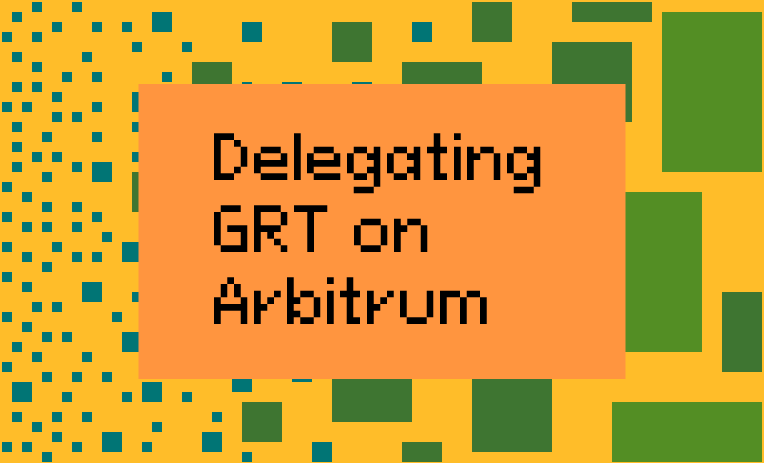
How to Delegate GRT on The Graph Network via Arbitrum
The Graph (GRT) plays a crucial role in the infrastructure of the decentralized web (aka web3). The Graph is often referred to as the indexing and query layer of web3, because it enables anyone to organize data (indexing) while also making it easy to retrieve organized data (querying). The Graph operates in a decentralized way thanks to its tokenomics and a network of participants, each of which can earn GRT (The Graph’s native work utility token) for contributing to the network.
Recently, The Graph Foundation announced new efficiencies to The Graph Network by scaling onto a Layer 2 solution called Arbitrum, that significantly reduces gas costs for network participants. By delegating your GRT on The Graph Network via Arbitrum, you’ll be able to save on gas fees and reap even more of the rewards and benefits for Delegators in comparison to interacting with the protocol on Layer 1 (Ethereum).
This guide walks you through how to choose an Indexer on The Graph Network, and how to optimize your delegation by delegating on Arbitrum.
Why Delegate GRT on Arbitrum?
GRT tokenholders weigh a few options when considering how to put their tokens to use. Hodling might be instinctive to many, but on The Graph Network you can also participate as a Curator to curate subgraphs to earn more GRT, an Indexer (like Braindexer!) to organize subgraph data, or you can become a Delegator. Holding your tokens takes no extra effort, but does not earn extra rewards. Curating and indexing both require more active attention to the network and carry risk of GRT loss.
Delegating is the process of locking away your GRT tokens to an Indexer of your choosing in order to earn rewards. Becoming a Delegator is the simplest way you can earn passive income on your existing GRT tokens without having to actively manage it or take on significant risk.
As a Delegator, you earn passive rewards on your existing GRT and help support the network. And if you choose to delegate to a smaller Indexer, you are furthering decentralization by supporting a broader pool of data providers!
Why delegate on Arbitrum? By taking advantage of the gas optimization and transaction speeds enabled by Arbitrum, you can enjoy the benefits of delegating while paying a fraction of gas costs.
How to Choose an Indexer on The Graph Network
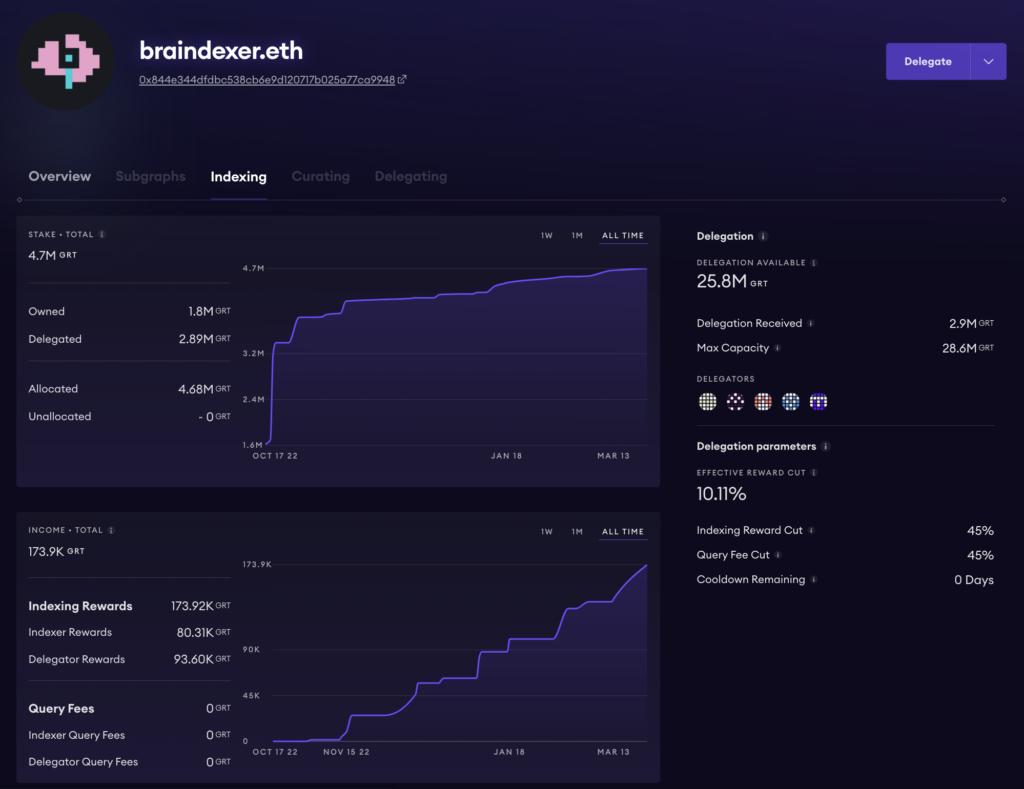
Let’s begin by understanding the various metrics displayed on each Indexer profile on The Graph Network. These metrics will be instrumental in evaluating Indexer performance and getting an understanding of what kind of rewards you can earn on your delegated GRT.
The first things most people notice in an Indexer’s profile are the Indexing Reward Cut and Query Fee Cut. At a basic level, this is how much the Indexer is willing to split rewards with their Delegators. Earning rewards is an integral part to delegating, so you want to make sure you’re happy with the percent allocation. Some Indexers will offer a high rewards allocation in the beginning in order to entice new Delegators, but then might change it over time. As with anything, if it sounds too good to be true, it usually is.
Another key metric to pay attention to is how much GRT does the Indexer have staked (self-stake) without any delegation. Once the Indexer reaches its max capacity, which is dictated by the amount of tokens it has staked, it cannot accept more until it adds stake. If the Indexer has a large amount of stake, that is a sign it is confident in its ability to earn delegation and therefore rewards.
Lastly, does your Indexer have a social presence? Is the individual (or individuals) available for technical assistance should something go wrong or you have questions? This is just as important as if the Indexer will earn rewards. Additionally, an Indexer’s social presence can be measured by their activity in The Graph Discord or community events, such as Indexer Office Hours.
Ready to delegate?
How to Delegate to an Indexer on The Graph Network
In order to delegate, you should have some GRT in a wallet, such as MetaMask or Coinbase Wallet. Don’t have a wallet? Learn how to set up a MetaMask wallet here, or a Coinbase Wallet here. For maximum security, it’s recommended you also utilize a cold wallet, such as Ledger or Trezor.
GRT can be acquired on centralized exchanges such as Coinbase, Kraken, or Gemini, or alternatively, acquired through decentralized changes such as Uniswap or Sushiswap.
What’s a good amount of GRT to delegate? That depends on your personal preference. If you are delegating on Ethereum mainnet, you may want to delegate a bit more to account for gas costs. However, because gas fees when delegating on Arbitrum are so low, there is more flexibility in the amount that you may wish to delegate via Arbitrum.
Have some GRT in your wallet? Let’s begin!
1. Head over to Graph Explorer on thegraph.com
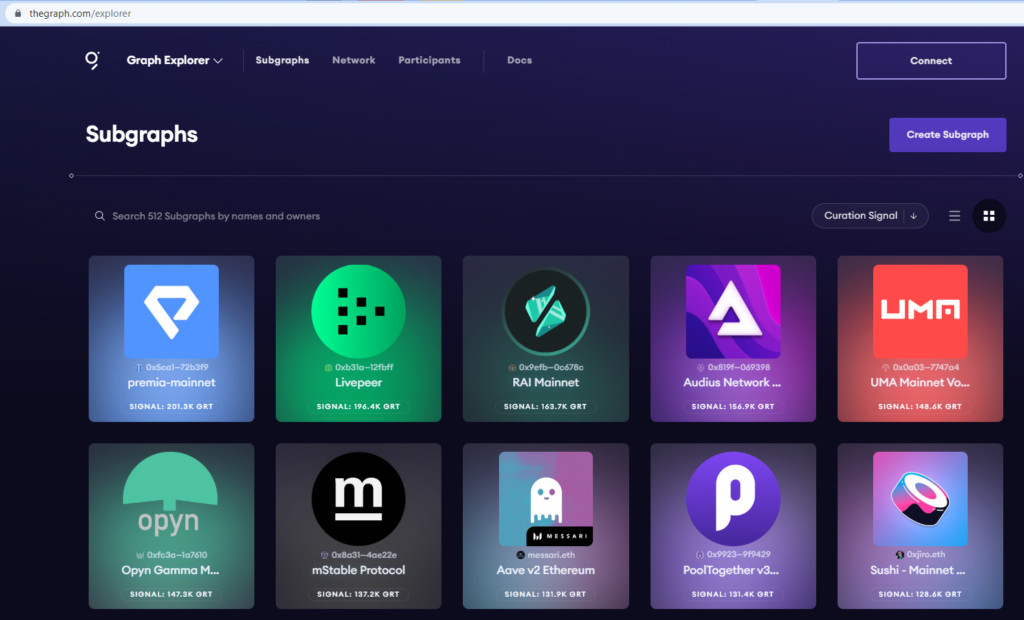
2. Select “Connect” in the top right and select which wallet you would like to connect

3. Now you’re connected!
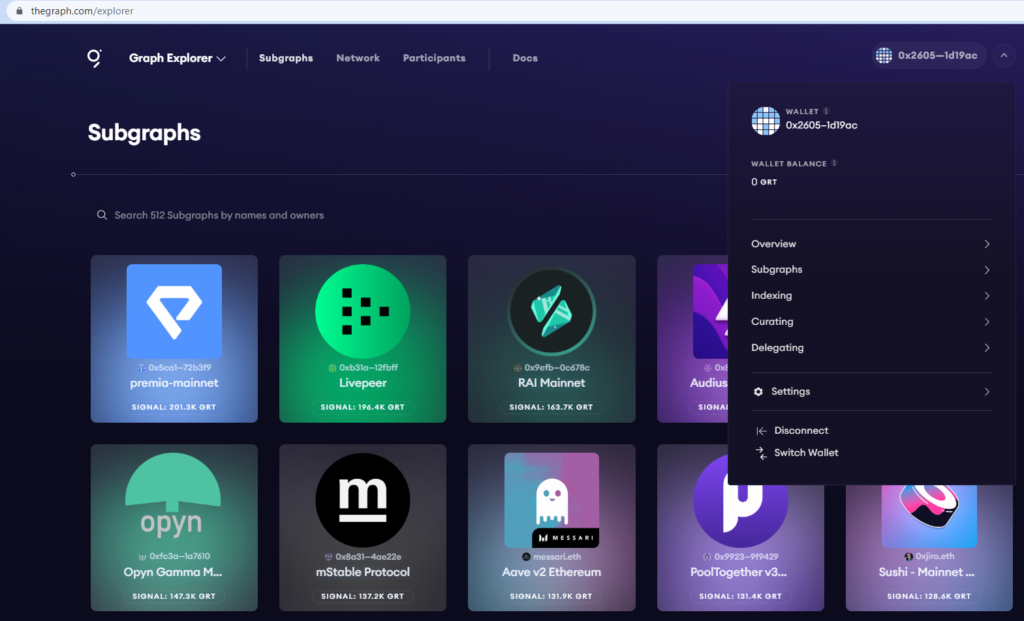
4. Select “Participants” in the top left and choose your Indexer
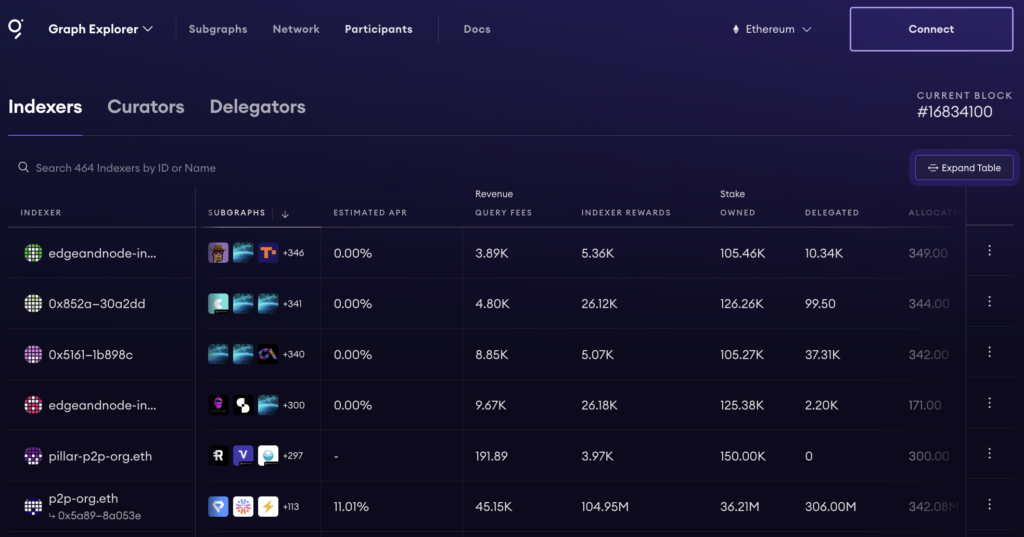
5. This is what an Indexer’s profile page looks like:

6. At this point, this is where you can decide to delegate via Ethereum or delegate via Arbitrum. Arbitrum is the network with lower gas fees and faster transactions.
Simply click on the toggle switcher in the upper right corner and select Ethereum or Arbitrum.
Note: At the time of this writing, indexing rewards are not fully enabled on Arbitrum yet. Follow Braindexer on Twitter to be the first to know the best time to start delegating on Arbitrum.

7. After choosing your desired network, select “Delegate”
Note: Not all Indexers are participating in the protocol on Arbitrum yet.
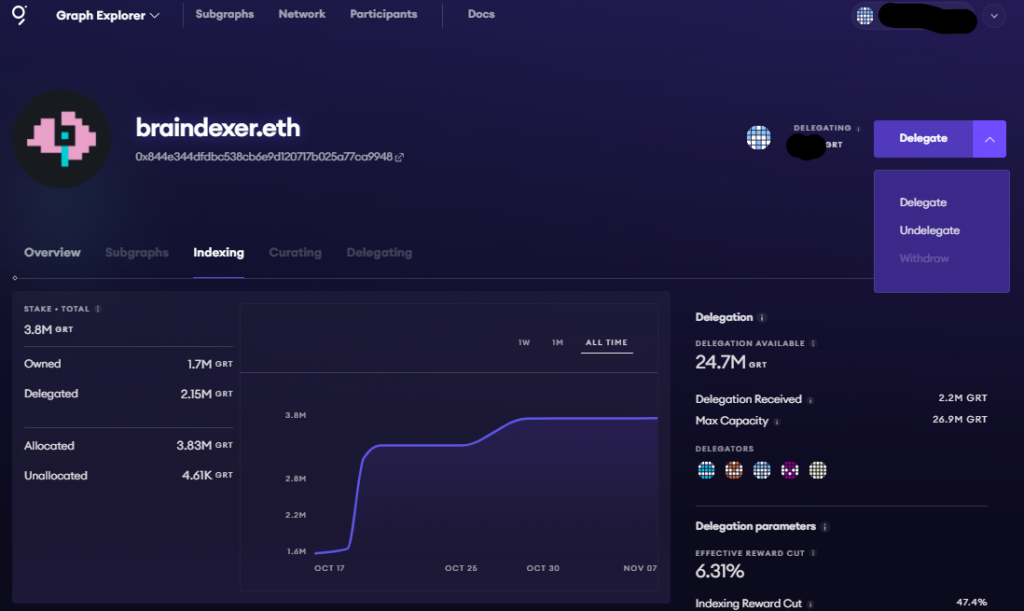
8. Choose how much GRT you’d like to delegate to this Indexer
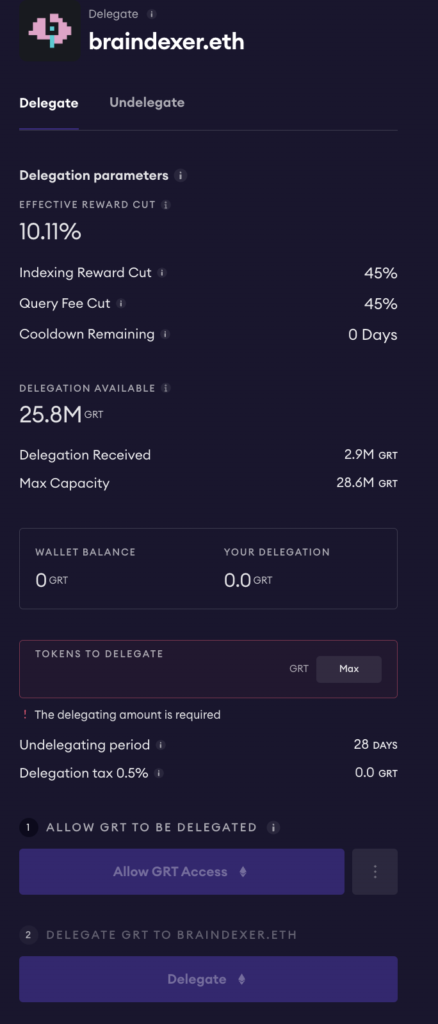
9. Make sure you have some ETH in your wallet (this applies to both Ethereum and Arbitrum) to pay for gas! The below screenshot depicts a transaction on Ethereum.

10. Confirm the transaction and you’re done! Welcome to delegating, and congratulations – you’re officially decentralizing web3’s data access layer!
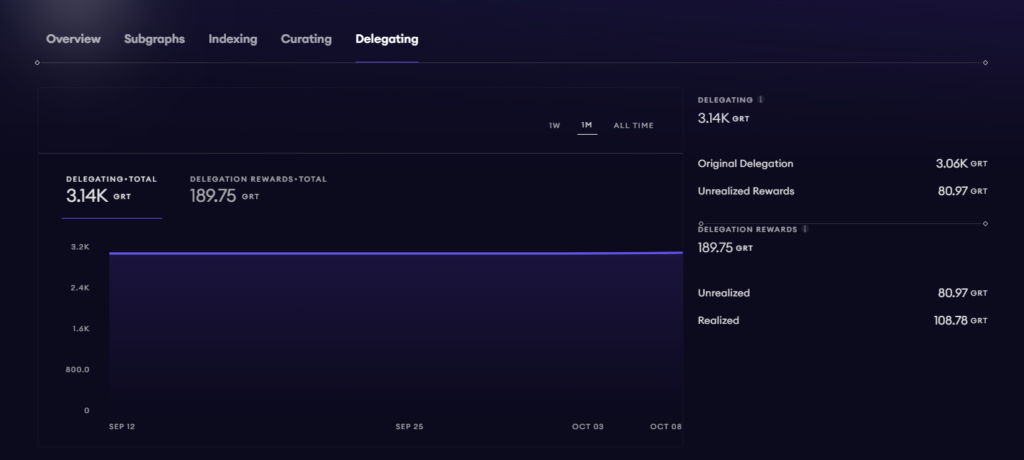
Stay tuned via Braindexer’s Twitter for the latest on The Graph Network’s L2 scaling efforts with Arbitrum. Looking for the Indexer profile link to delegate to Braindexer? Delegate here!
Glossary: The Graph Network Indexer Attributes
Stake Total → Total number of tokens, including rewards
Owned → The amount of GRT held by the indexer to run indexing functions, not delegation
Delegated → The amount of GRT committed to this indexer, outside of normal indexing functions
Allocated → Tokens staked to a subgraph
Unallocated → Any tokens available to be staked to a subgraph
Delegation Available → How much stake this indexer can accept (The Graph allows 16x the “Owned” amount”), minus any that has already been delegated
Delegation Received → How much stake from users has been committed to this indexer
Max capacity → the most amount of GRT this indexer can accept
Delegation Parameters → the rules this indexer has set for any delegators
Indexing Reward Cut → % of rewards the Indexer keeps
Query Fee Cut → % of query fee rebates the Indexer keeps (queries are when a subgraph pulls data from the blockchain, which the indexer helps organize)
Cooldown Remaining → How long until the Indexer can change their delegation parameters again
Indexing Rewards → Total rewards earned
Indexer Rewards → Rewards tokens earned by the Indexer
Delegator Rewards → Rewards tokens earned by delegators
Query Fees → Total fees paid to this Indexer
Indexer Query Fees → Query fees earned by the Indexer
Delegator Query Fees → Query fees earned by the Delegator
About Braindexer
Braindexer is a team of web3 brainiacs on a mission to index the decentralized internet. We’ve created a highly effective, innovative, and adaptive Indexer that rewards our Delegators, provides reliable and quality infrastructure to developers, and supports a multi-chain future.


